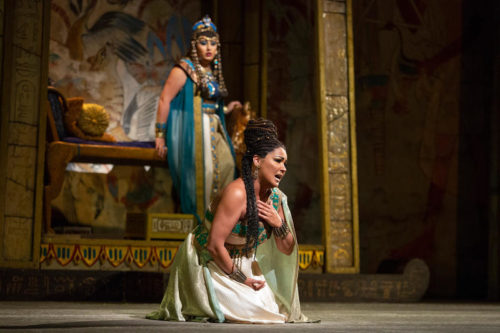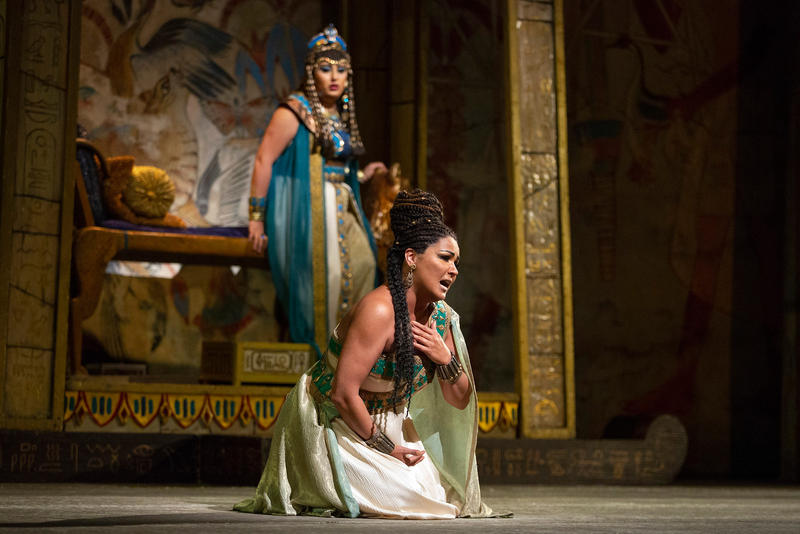 United States Verdi, Aida: Soloists, Chorus and Orchestra of Metropolitan Opera, New York / Nicola Luisotti (conductor). Broadcast live from the Metropolitan Opera, New York, on 6.10.2018 and reviewed as a Nightly Met Opera Stream on 7.4.2020. (JPr)
United States Verdi, Aida: Soloists, Chorus and Orchestra of Metropolitan Opera, New York / Nicola Luisotti (conductor). Broadcast live from the Metropolitan Opera, New York, on 6.10.2018 and reviewed as a Nightly Met Opera Stream on 7.4.2020. (JPr)

Production:
Production – Sonja Frisell
Set designer – Gianni Quaranta
Costume designer – Dada Saligeri
Lighting designer – Gil Wechsler
Choreographer – Alexei Ratmansky
Cast:
Aida – Anna Netrebko
Amneris – Anita Rachvelishvili
Radamès – Aleksandrs Antonenko
Amonasro – Quinn Kelsey
Ramfis – Dmitry Belosselskiy
The King – Ryan Speedo Green
Live in HD Host – Isabel Leonard
Live in HD Director – Gary Halvorson
No mere hyperbole for once from a Live in HD Host as Isabel Leonard introduced this 2018 transmission of Aida from the Met (click here for Robert Beattie’s review) with the words about how what we would see would be ‘Grand Opera on opera’s grandest stage’. Thanks to their free Nightly Streams there was an opportunity for me to see Sonja Frisell’s 1988 production (here revived by Stephen Pickover). When first put on it replaced a planned staging by the late Franco Zeffirelli which had been deemed too expensive. I have written before about my amazement at how Zeffirelli could have possibly thrown more money – and people – on stage than we saw here. Frisell gave us horses – so perhaps Zeffirelli wanted elephants too? Anyway, if the world returns to ‘normal’ later this year and the Met’s finances allow it to proceed with its planned 2020-2021 season, then this production has now had its day and will be superseded by Michael Mayer’s new one which promises a ‘grand new staging, which brings ancient Egypt to life with intricate projections and dazzling animations’. Anna Netrebko and Anita Rachvelishvili – who gave the standout performances in this revival – will again be Aida and Amneris.
What we saw was impressive even on a laptop screen: Gianni Quaranta’s huge sets gave it a three-dimensional monumentality with the large columns, imposing statuary, as well as, all the hieroglyphs and there was more than a hint of the Temple Complex of Karnak in Thebes. It was given an imposing sun-baked grandeur thanks to Gil Wechsler’s lighting which also often helped to make some of Dada Saligeri’s extravagant costumes sparkle. All of this was well-captured in Gary Halvorson’s direction for the broadcast which included an overhead camera on a lighting gantry: this immersed those watching this recording in the spectacle from time to time and brought power and grandiosity to all the crowd scenes.
So, whenever the stage could be filled to overflowing, it was. Frisell had a massive chorus, added extras, brass players, dancers and a horse-drawn chariot. Too many years ago than I care to remember, there was an Aida I saw in Vienna – with Gianni Raimondi as Radamès – which gave me a frisson that I long for every time I return to an opera house but rarely get these days. Then the Act II Grand March came from upstage and seemed to go on forever. Frisell has her extras circle behind the set to reappear time and again with different bits of costume or props to try and convince us there is a cast of thousands rather than several dozen! (This is something I once ‘memorably’ saw happen at Covent Garden in 1977 where with each return those involved got visibly more and more tired!) However, as the stage slowly lowered to reveal those involved in this Triumphal Scene it was a true coup de théâtre; just as it was when – as the camera pulled back – we saw it descend to entomb Aida and Radamès at the end of their final duet (‘O terra, addio’).
The incomparable Met chorus – splendidly drilled by their chorus master Donald Palumbo – impressed once more either with their stentorian power or quiet a cappella singing. Alexei’s Ratmansky’s fey choreography for the dance numbers was rather a let-down. There was a duet at the start of Act II that was part-Daphnis et Chloé and part-Le Corsaire and this was followed by a dance for eight couples during the triumphal march scene which had lively and intricate steps, yet was entirely inappropriate when something more orgiastic – think The Rite of Spring – was needed.
I must temper my comments about the singing with the realisation of how I was hearing it though speakers on my laptop, however good these are! Nevertheless, if Anna Netrebko or Anita Rachvelishvili were half as good in the theatre as they sounded to me then this would still have been an outstanding performance from the two of them. There was a 2011 National Theatre play when Benedict Cumberbatch and Jonny Lee Miller alternated the leads roles of Frankenstein and his monster creation. I firmly believe Netrebko and Rachvelishvili could do the same with Aida and Amneris! Each has great lung power, but they can also reduce their sound with thrilling effect when Verdi requires them to do so and float pianissimos with assurance. Their acting was distinctly ‘old school’ and Netrebko and Rachvelishvili just moved to their mark on the stage, stood there and sang, relying on their impeccable phrasing for anger, passion, or some other dramatic truth.
Netrebko’s Act I ‘Ritorno vincitor’ was a stentorian paean for her lover’s safe return while her plaintive ‘O patria mia’ down by the Nile was a showstopper where she displayed some gorgeous soft tones and gave attention to an eloquent legato. It was interesting to hear Netrebko give an insight into the role of Aida in a backstage interview with Isabel Leonard (that you can find in full on YouTube) and how her character ‘says pieta about 30 or 40 times during the opera and all of these pieta has to be different … so you try to find many differences in this only one single word.’
It was difficult to pick out anything Rachvelishvili sang that wasn’t a vocal highlight but if pressed then it must be her Act IV cursing of the priests who condemn Radamès and then her prayer to Isis, both of which seemed as if they soared effortlessly over the splendid Met orchestra.
Quinn Kelsey’s firm, sonorous, slightly roughhewn, singing was entirely appropriate for Aida’s father Amonasro. The High Priest, Ramfis, was stolidly sung by Dmitry Belosselskiy and Ryan Speedo Green brought gravitas and cavernous low notes to his imposing King. However, these stellar voices were undermined somewhat by Aleksandrs Antonenko who was not in their league as Radamès. Hindsight is not always a good thing but the vocal issues Antonenko has subsequently suffered are clearly in evidence with his performance here. He fought hard throughout to keep control of a brawny, slightly gruff, voice. Sometimes he won, sometimes he didn’t, such as at the end of ‘Celeste Aida’ where he belted out a hard-won top note when the high B should have got quieter the longer it went on.
Nicola Luisotti always seems peerless in this repertoire and it sounded as if he conducted an expressively beautiful account of the score drawing exquisite colours and nuanced virtuosity from his orchestra.
Regrettably the Met’s musicians, as well as the chorus, are out of work until this coronavirus pandemic can be overcome and even more sadly a violist, Vincent Lionti – who possibly was in the orchestra for this Aida – has died due to complications related to Covid-19. We hope for better times for all concerned in the future. Thankfully these Nightly Met Opera Streams continue (click here) giving us the opportunity to catch up on anything you might have missed. I have already enjoyed a superb 2008 La bohème with Angela Gheorghiu’s remarkable Mimì and Ramón Vargas’s lyrical Rodolfo (with Luisotti conducting), and an equally stunning 2009 Lucia di Lammermoor with Marco Armiliato conducting Netrebko, Piotr Beczała, and Mariusz Kwiecien; a cast that I am unlikely to see and hear bettered in this Donizetti opera from others of the current generation of singers.
My final ‘thought for the day’ is that a production like this would never be seen in this country, not just because none of our opera houses could afford it, but also that it was not entirely PC with a number of white singers clearly sporting deeper tans than usual as Egyptians and Ethiopian captives.
Jim Pritchard
